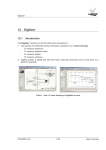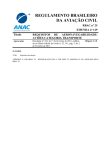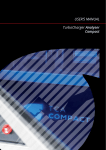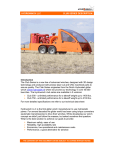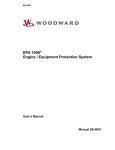Download 8. Engines
Transcript
Engines 8. Engines 8.1 Introduction The Engines module is used to display or introduce the characteristics of a given engine, i.e.: - its geometrical characteristics - its weight characteristics - the characteristics of the various systems that are part of it (reduction gear, turbocharger, …) - its performances - the 3-view drawings The data can be downloaded from the PCA2000 website or inserted by the user via the PCA2000 interface. Thereafter, in the PCA2000 analysis and design modules, mentioning merely the name of the engine will imply the knowledge of all its technical characteristics. Figure 8.1 : Generalities PCA2000 V2.5 1/22 User’s manual Engines 8.2 Table of content 8. ENGINES ..................................................................................................................... 1 8.1 Introduction................................................................................................................... 1 8.2 Table of content............................................................................................................ 2 8.3 8.3.1 8.3.2 8.3.3 8.3.4 Engines ........................................................................................................................ 3 Description ............................................................................................................... 3 To visualize the characteristics of a given engine .................................................... 4 Introduce the characteristics of a new engine ........................................................ 17 To save the data file related to the new engine...................................................... 22 PCA2000 V2.5 2/22 User’s manual Engines 8.3 8.3.1 Engines Description To access the Engines module, click on [Analysis] then [Engines] of the menu bar of the in the vertical toolbar. main window. You can also reach it directly by clicking on Figure 8.2 : Engines You can press on the F1 key at any time to reach the contextual help. To navigate within the controls of a window, use the tab key. PCA2000 V2.5 3/22 User’s manual Engines 8.3.2 To visualize the characteristics of a given engine Once you open the Engine module, all the references related to data files of engines stored in the Engines directory of PCA2000-Data are automatically downloaded in the application. To visualize the characteristics of a given engine, click on the engine reference that appears in the drop-down list under Model. All the tabs in the Engine window are now accessible. 8.3.2.1 Generalities The first tab gathers general data related to the selected engine. Figure 8.3 : Generalities PCA2000 V2.5 4/22 User’s manual Engines 8.3.2.2 Specifications The second tab displays the geometric characteristics of the selected engine as well as its weights. Figure 8.4 : Specifications 8.3.2.3 Weight The third tab displays the weight characteristics of the selected engine as well as its centre of gravity position and its moment of inertia. Figure 8.5 : Weight PCA2000 V2.5 5/22 User’s manual Engines 8.3.2.4 Systems The fourth tab displays the data related to the various systems that are part of the selected engine. Click on one of the option buttons to display the information about the corresponding system. Once the mouse pointer leaves the drawer, the drawer closes itself. To reopen it, move again the mouse pointer on it. Figure 8.6 : Systems PCA2000 V2.5 6/22 User’s manual Engines 8.3.2.5 Gearbox Figure 8.7 : Data related to the gearbox If the engine is equipped with a gearbox: 1. Check the check box Gearbox, 2. Insert its various characteristics from which at least, the gearbox ratio. PCA2000 V2.5 7/22 User’s manual Engines 8.3.2.6 Turbocharger Figure 8.8 : Data related to the turbocharger If the engine is equipped with a turbocharger: 1. Check the check box Turbocharger, 2. Insert its various characteristics from which at least the critical altitude. PCA2000 V2.5 8/22 User’s manual Engines 8.3.2.7 Fuel system Give at least the fuel used . Figure 8.9 : Data related to the fuel system 8.3.2.8 Oil system. Figure 8.10 : Data related to the oil system PCA2000 V2.5 9/22 User’s manual Engines 8.3.2.9 Cooling system. Give at least the cooling system used. Figure 8.11 : Data related to the cooling system 8.3.2.10 Manifold system. Figure 8.12 : Data related to the manifold system PCA2000 V2.5 10/22 User’s manual Engines 8.3.2.11 Ignition system. Figure 8.13 : Data related to the ignition system 8.3.2.12 Exhaust system Figure 8.14 : Data related to the exhaust system PCA2000 V2.5 11/22 User’s manual Engines 8.3.2.13 Lubrication system. Figure 8.15 : Data related to the lubrication system 8.3.2.14 Starter Figure 8.16 : Data related to the starter PCA2000 V2.5 12/22 User’s manual Engines 8.3.2.15 Performances The fifth tab gathers the data related to the performances of the selected engine. Figure 8.17 : Performances If the engine can run in overspeed during a given period of time, 1. Check the check box Operation allowed in overspeed. , 2. Specify the engine power, the corresponding engine rating as well as the maximum period of time allowed If the power curves are available, check the check box Power. If the specific fuel consumption curves are available, check the check box Fuel consumption. PCA2000 V2.5 13/22 User’s manual Engines 8.3.2.16 Performances curves The sixth tab contains all the information related to the performance curves of the selected engine: - Maximum continuous power. - Maximum power at take-off. - Specific fuel consumption. The different curves are presented as points included in the table. Figure 8.18 : Performances To visualize the table information in a graphic, click directly on the [Graphic] tab or click on located in the upper left part in the table. the button Click with the left button of the mouse on the column title or on the line number to select the entire column or the entire line. Click with the right button of the mouse once it is on the table to activate the functions [Cut], [Copy], [Paste]. Use those 2 functionalities to fill in the table with the values copied from other PCA2000 tables or spreadsheets such as Excel for example. While proceeding in that way, you speed up considerably the introduction of data and you avoid transcription errors. PCA2000 V2.5 14/22 User’s manual Engines X coordinates Y coordinates Figure 8.19 : Performances curves To display other information: 1. Open the drawer by moving the pointer of the mouse on it 2. Chose the information that you wish to visualize. The display is done automatically. The drawer closes itself automatically once you move the mouse pointer away from it. Once you move the mouse pointer on the graphic, the coordinates of the mouse pointer are displayed in the 2 areas located under the graphic. Use the arrows Í Î Ï Ð of the keyboard to move precisely the mouse pointer. PCA2000 V2.5 15/22 User’s manual Engines It is also possible to display the 3 views drawings of the engine: - Front view. - Side view. - Top view. In order to do that: 1. Move the mouse pointer on the drawer to open it 2. Select then the view that you wish to see displayed. The files associated with the data file have to be named in the following way: - Front view : NameOfTheDataFile-FR.jpg - Side view : NameOfTheDataFile-SD.jpg - Top view : NameOfTheDataFile-TP.jpg Figure 8.20 : 3-view drawings PCA2000 V2.5 16/22 User’s manual Engines 8.3.3 Introduce the characteristics of a new engine To introduce in the database the characteristics of a new engine, 1. Click on [File] then [New] of the menu bar of the main window. The Engines module is initialized. 2. Introduce the name of the new engine 3. Click on . Figure 8.21 : Definition of the model PCA2000 V2.5 17/22 User’s manual Engines 8.3.3.1 Definition of the general information Introduce the general information in relation with the new engine Figure 8.22 : Generalities 8.3.3.2 Definition of the geometrical information Introduce the information in relation with the engine geometry. Figure 8.23 : Specifications PCA2000 V2.5 18/22 User’s manual Engines 8.3.3.3 Definition of the geometrical and weight information Introduce the information in relation with the engine weights. Figure 8.24 : Weight 8.3.3.4 Definition of the information in relation with the various systems Introduce the information in relation with the various systems that equip the engine. Figure 8.25 : Systems PCA2000 V2.5 19/22 User’s manual Engines 8.3.3.5 Definition of the performances Introduce the information in relation with the general performances. Figure 8.26 : Performances PCA2000 V2.5 20/22 User’s manual Engines 8.3.3.6 Performances curves Introduce the information in relation with the power and specific fuel consumption curves. Figure 8.27 : Performances Click with the left button of the mouse on the column title or on the line number to select the entire column or the entire line. Click with the right button of the mouse once it is on the table to activate the functions [Cut], [Copy], [Paste]. Use those 2 functionalities to fill in the table with the values copied from other PCA2000 tables or spreadsheets such as Excel for example. While proceeding in that way, you speed up considerably the introduction of data and you avoid transcription errors. PCA2000 V2.5 21/22 User’s manual Engines 8.3.4 To save the data file related to the new engine In order to save in a file the information related to a new engine, click on [File] then [Save as] in the menu bar in the main window. You can also do it by clicking on in the toolbar. The dialogue box [Save as] is displayed on the screen. The name of the file will be NameOfTheEngine.eng The file will be saved automatically in a specific folder according to the type of the engine : - 2 Strokes: PCA2000-Data\Engines\2 Strokes\NameOfTheEngine - 2 Strokes Diesel: PCA2000-Data\Engines\2 Strokes Diesel\ NameOfTheEngine - 4 Strokes: PCA2000-Data\Engines\4 Strokes\ NameOfTheEngine - 4 Strokes Diesel: PCA2000-Data\Engines\4 Strokes Diesel\ NameOfTheEngine - Rotary: PCA2000-Data\Engines\Rotary\ NameOfTheEngine - Turboprop: PCA2000-Data\Engines\Turbopropeller\ NameOfTheEngine. Figure 8.28 : Save the data file PCA2000 V2.5 22/22 User’s manual






















